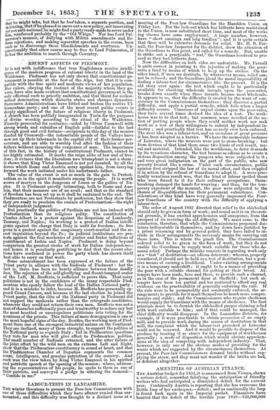RECENT ASPECTS OF PIEDMONT.
IT is not with indifference that true Englishmen receive intelli- gence of the modern progress of rational liberty in the land of the Waldenses. Piedmont has not only shown that constitutional go- vernment is possible at the foot of the Alps, but that it is com- patible with the free spirit and moderate views of her population. Her rulers, obeying the instinct of the majority whom they go- vern, have also made evident that constitutional government is the only effectual curb to priestly ambition, and that thirst for ecclesi- astical domination which disturbs states and changes dynasties. Successive Administrations have bitted and broken the restive Irl- tramontane party; and one of the most recent public events is deeply significant of the future of religious liberty in Piedmont. A 'church has been publicly inaugurated in Turin for the purposes of divine worship according to the ritual of the Waldenses. Fiercely persecuted for centuries—aided by Oliver Cromwell with strong words and subsidies of English gold—faithful to the last through good and evil fortune—recipients to this day of the monies funded by Cromwell—the indomitable people of the Valleys have now set up their tabernacle in the capital city of their former per- secutors, and are able to worship God after the fashion of their fathers without incurring the vengeance of man. The importance of this fact, in the history of constitutional Piedmont, cannot be too highly estimated. It marks the reign alike of law and of free- dom ; it evinces that the liberalism now triumphant is not a sham ; it shows that King Victor Emanuel is not yet daunted, by all the forces which Rome and Austria array against him, from carrying forward the work initiated under his unfortunate father.
The value of the event is not so much in the gain to Protest- antism as in the spirit it manifests among the people. It is worth scores of martyrs in the dungeons of Lucca or the gallies of Na- ples. It is Piedmont quietly intimating, both to Rome and Aus- tria, that their menaces are of no avail; and that as the standard of freedom has been set up so it shall be sustained to the end. The Piedmontese are not Protestants by profession, but they show that theY are ready to proclaim the essence of Protestantism—the right of independent judgment. But practically the politics of Sardinia are not less imbued with Preteetaiitism than its religious polity. The constitution of Charles Albert is a protest against the despotism of Lombardy, Tuteany, and Naples; its working is a protest of Italian intelli- gence against the charge that Italy is unfit for freedom ; its free i
press is a.protest against the sanguinary court-martial and the se- cret inquisition beyond the,Po ; its judicial institutions are pro- tests against the foul mockeries of justice and fouler inflictions of pimishruent at Ischia and Naples. Piedmont is doing beyond eothparison the greatest stroke of work for Italian independence; and hence it is peculiarly gratifying to find that the recent elec- tions hate confirmed in power the party which has shown itself best-able to carry on that work. Some astonishment has been expressed at the failure of the Priest party in alliance with the Radicals of Piedmont : but the fact is, there has been no hearty alliance between these deadly foes. The rejection of the self-glorifying and fluent-tongued orator of the Left, M. Brofferio, is sufficient to prove this. That noisy politician is not in the confidence of the many respectable Pied- montese who openly follow the lead of the Italian National party ; and it is a mistake to infer, because M. Brofferio has personally op- posed Count Cavour, and because at the last election he joined the Priest party, that the elite of the National party in Piedmont did not support the moderate rather than the retrograde candidates, wherever they could not return their own men. Brofferio was not a man of character sufficiently pure and trustworthy to seduce any but the most besotted or unscrupulous politicians into voting for the nominees of the priests. This failure of mere demagoguism is one of the most hopeful signs of the day. Besides, the working men of Pied- montlorm one of the strongest industrial unions on the Continent. They are inclined, many of them strongly, to support the politics of the 31-aflonal party as regards Italy ; but in Piedmontese questions they tote for men who will give effect to Piedmontese politics. The'amall number of Radicals returned, and the utter failure of the joint effort by the wild men on the extreme Left and Right, show thatthe Piedmontese constituency is sound at heart, and that the Tindifiontese Chamber of Deputies represents the common sense, intelligence, and genuine patriotism of the country. And such was the view taken by King Victor Emanuel in his spirited and: patriotic speech at the opening of the session ; where, address- ing the representatives of his people, he spoke to them as one of their patriots, and conveyed a pledge in uttering the demand- " Confide in me."


































 Previous page
Previous page